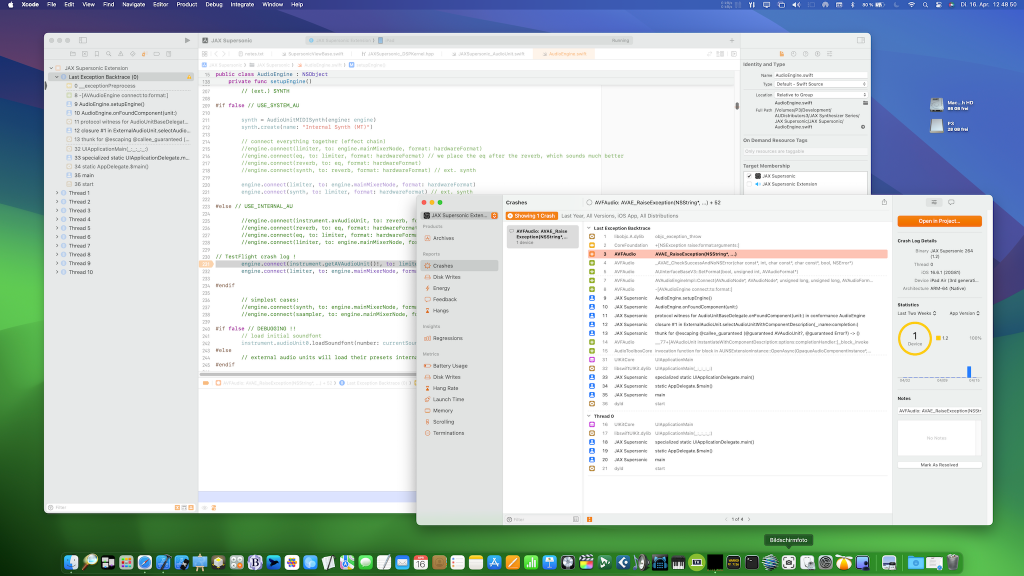- everything in our collections is based on advanced IA !
- this site is managed by I.A. too

A few words
about crash reports
While this kind of direct support for developers turns out to be very handy, only very few users are actively supporting their developers with direct crash reports. ( This is just simply done by enabling Apples inbuilt crash reporting features on the devices. )
So most reports, we are seeing come from explizite crash reporting generated by Apples TestFlight. Most of these are completely anonymous, this means we cannot see who generated it, the e-mail for direct support must be provided explicitly by the users via TestFlight. So TestFlight and betas are important for developers.
Here is a screenshot, that demonstrates how this works :

In the screenshot above you can see, all important and required information for a developer is there and you finally are even able to exactly identify ( and fix ) the issue or just work around it.
This is such a crash report, generated by TestFlight from anonymous usage, where you can see the exact line of code in Apples Xcode compiler environment with the loaded project.
The report was generated on a device, which obviously was not updated for a longer time. It (exemplary) was an IPad Air (3rd Gen.) with iOS 16.6.1 in this case. Most crashes we see, b.t.w. are coming from outdated devices and operating system versions by the way.
( This is especially true with the iOS music community, sometimes using unacceptable old devices and OSs – then blaming developers for their crashes! Unfortunately there is no real support from Apple to exclude some sort of devices from distribution. Merely only supporting latest OS version would help here – but potentially reduct the sales to virtually zero then. If I was Apple, I would actually check which OS version the users have installed, prior considering them being eligible for a refund. And refunding users without letting the developer know at all, what the exact reason for the refund was, is generally idiotic like hell. )
But the really interesting part here is the crash reason. The crash was obviously caused by an artificial Apple exception (most crashes on Apple’s devices are of that kind by the way). AVAudioEngine is particularly extremely prone to such artificially generated crashes, instead just skipping one step silently or just providing a useful error message to the user, for instance…
It remains still a miracle, why it crashes on this particular user device, as we test on at least 3 different latest Apple devices on all platforms ( iOS, iPadOS, macOS – everything Apple Silicon with actual iOS versions ), but we are able to work around in this special case.
In this case we will remove that idiotic Apple AUPeakLimiter, a system component, which obviously is not able to connect to the native hardware sample rate (!) of the device and thus is creating a crash and blaming the 3rd party developers for that. ^^
So the crash is NOT caused by JAX Supersonic AudioUnit, but by the host app, using Apples inconsequently designed audio system components.
The ‘issue’ will be fixed with next update, as it also does not even affect the operation of the JAX Supersonic AudioUnit.
Addendum: 90 percent of crash reports we see, are caused inside the Apple audio frameworks and we merely do apply workarounds to that then, if even possible.
A few words
for why we dropped active Intel device support
The crash report example above demonstrates implicitly an important consideration to us. Most Apple devices, where our AudioUnits are used, are Apple Silicon devices.
A year ago we still used Apples latest Intel MacBook Pro 16 with external monitors for app development. This machine was quite busy when compiling our projects, some of them required extremely long compile times and that device was running hot all days long, endlessly generating ventilation noise.
Now, for some time, we use Apples latest MacBook Pros with M2 Pro / M3 Pro Processors and this is much much faster and also cooler ( in the word’s true sense here ).
But the real reason why we now switched to Apple Silicon completely is, that these devices are running the same chip family as the destination devices.
The Intel machine was generating code for the Silicon devices, but in reality we could not be sure, whether it really would would work on the user’s destination devices as to expect and many issues just could be translation issues from the compiler, even in such sensitive areas as the audio processing area.
But on the counter side, we are now not able anymore to consequently support old Intel architectures actively. The old MacBook Pro 16 does not get switched on lately very often …
Well, and the current Apple compilers, running natively on the M1/2/3 chips are still able to produce universal binaries for the Intel family of processors on the Mac. But we cannot be sure about the results and so we will drop and tear down Intel support for our releases and updates.

hello there and thank you for your information – I’ve definitely picked up anything new from right here.
I did however expertise a few technical issues using this website,
as I experienced to reload the web site lots of times previous to I could get it to load properly.
I had been wondering if your web hosting is OK? Not that I’m complaining, but sluggish loading instances times will sometimes affect your placement in google
and could damage your high quality score if ads and marketing with Adwords.
Well I am adding this RSS to my e-mail and can look out for a lot more of your
respective interesting content. Ensure that you update this
again soon.. Escape room lista
Hm. We are using usual WP backend. If there are issues, this are most likely caching issues. B.t.w: Your own website linked is not working at all, because you are not using an (obligatory) SSL connection and this is generally blocked by Apples devices. Our users use Apple devices explicitly.
Great, eyes opening article about public criticism to developers and their products coming from customers self importance and waiting for free or discounted apps. Good lesson to myself. Thanks!
Oh, well…
they see it probably differently. 😂
There seems to be some trouble with your website, as the articles about Gavinski and ninobeatz have disappeared, giving some confusion for the folks who come visiting.
Luckily, I’ve saved thes webpages. Let me know if you’d like to have it so you don’t have to type it in again from memory!
( This comment looks quite suspicious (somewhat hypocritical). You are probably a stalker from the ABF, aren”t you? )
We suspended these articles, because the ABF still started some threads with untrue claims, half knowledge and royalty free psycho analysis again. So we want to calm down this.
For a clarification: We were initially banned there by the owner, who took away our complete access to the forum. And AFTER that we asked for removing all the threads regarding us and our products, because we were not able to inter-vent and unleash all the lies there any longer. However the owner DENIED that and so left all the wild rumors there, even further developing it absurdly afterwards…
But we also had some friends there (i.e. the famous member “White”), who then actually helped us and removed all our product threads and at all my personal real name from that cloak afterwards. Because he was the originator of the product announcement threads and he was always objective, not excluding or judging anyone. This member (our hero!) actually then left that forum with us shortly after that, which was his legitime right and a consequence and a demonstrative solidarity with the punished.
This public forum is overly toxic and especially actively small-business-damaging and we probably will fight against them repeatedly. They are extremely good (experts!) in twisting the truth afterwards, especially if the subjects of their claims cannot intervene any longer.
ps: We could compile an entire list of suspicious members there, but anyone with some brain could actually discover that self. However we generally would recommend, NOT to waste any life time there! Much there is and will lead to pure frustration, loss of creative energy, possibly also mental health problems and kinds of self destruction attacks…
I still remember the very first response per email after I started proudly my business with a first release in the Apple AppStore (with nearly a year of preparation for this). It was a person from exactly this audiobus forum, asking me in a extremely offensive manner, how I even dare to release such a ‘shit’. And I also remember the flood of negative 1 star reviews in the appstore with nicknames that could be found at that audiobus forum too…
Finally: A “community” that is not able to identify their ass-hole elements (and get rid of them) is not more or less than an ass-hole in its entirety. (analogy : see racism, faschism ) And by the way, a ‘community’ that is built on 90 percent of anonymous’, ( whereby most of them seem to have multiple anonymous personalities (meaning: profiles – at least one hypocritical and some more for attacking on demand) ^^ ) is not seriously a community.
Yeah, it sometimes needs harsh words for human brain activation, doesn’t it?
Hi Jens,
Since you’re selling your apps as a sole proprietor, under your name – as visible on the app store pages – privacy and data protection rights don’t apply to your name being displayed publicly. Even if you changed this and founded a company, e.g. JAX GmbH, as long as you’re the owner or top executive, your personal details will be publicly available for viewing. In some countries business owners’ birth date and mother’s name is also publicly listed.
The only way you could file privacy or data protection complaints against AudioBus or any other entity is if you were an employee who is not a company decision maker and consistently keeps his employment status private, like not participating in any public talks or events as an employee of the company, etc.
Hope this clears things up.
Well this is OK. But if someone tells lies or nonsense about me publicly and anonymized, what’s then?
And what is, if I am actively hindered to intervene there?
( And if a certain forum is very active (with anonymous people – even obviously giving bad people all freedom to create multiple annonymous accounts for such action), then generating rumors, claims, lies and all such, repeatedly and massive, even talking nonsense about my psychic health, with my real name published there or calling me and my products by name then – this is active business damage, right? )
It very much impacts small independent developers, who are published with their real name.
Apple unfortunately has chosen to publish that.
Nobody ever would actually perform such with the real name of the CEO from any company.
This is the kernel of the problem.
This is a one men business – and some ill people (and also ‘smart’ competitors) are thinking, they can anonymized perform all their hating there unpunished, because there is someone who can be broken personally and his business can be destroyed – what a fun !
It’s not an easy matter for sure. While privacy and data protection does not apply because you’re a sole proprietor, the only legal avenue that can be explored is libel and defamation laws, etc.
But I recommend starting fresh with the operator of the forum, build a better relationship so you can have a way to reply to any bad-faith posts. Other than that what you can really do is release excellent products + create high quality demo videos, provide excellent support and you will win over people. And minimize any attack surfaces, like getting into some heated exchanges and public arguments. That will just weaken your case and if people will post about that, that’s completely within their right. The more you minimize the chance for that, the better things will get, as more people will support you publicly. I see no other way. Maybe seek out brand new forums and communities, or try getting a “brand ambassador” – a respected advocate who enjoys your products.
One more thing as a personal advice: some negative comments are better left alone, unless it could be immediately disproved or clarified in a short response (or unless it’s a valid point and you can take it as feedback for improvement or is something to consider for your next product). There will always be negative people with a lot of subjective opinions and even hostility.
Yes, I am understanding.
But lastly I am a human, a single person who tries to get some income from creative work.
This ‘business is more an ‘art’. This means, I do not feel like a company at all and possibly never will, as it conflicts with my entire personality and my creativity.
The theme with the ABF is definitively finished. I won’t go back there ever.
It effectively does take all my creative energy and time. There is too few time already for all my goals.
( And I am also thinking, that this ABF forum and the activities there is totally unimportant for the real music and creativity scene. Members there are basically just app collectors and discussion addicts or intrusive product promoters and self-centric so-called influencers who want to make money. It is in no way a ‘community’ and I feel no obsession for applying to such. Possibly I also shall not overheat again, if some idiot there runs out of control. They are actively deconstructing themselves since years. )
Thank you!
Hi,
I don’t want to write a public rant, I would much prefer a support channel or bug tracker, but I can’t find anything like that, I couldn’t even find an imprint with an email address, so this is my only option.
I bought the JAX MIDI ModulePlayer to have an additional Sound Font for my own productions with DAWs. I expect an audio unit to automatically restore parameters such as selected presets after opening a project in a host. JAX MIDI ModulePlayer does not do this. If I load any MIDI files from the Internet that select presets via MIDI, they work perfectly when I play them back with KQ Sampei, but if I play them back with JAX MIDI ModulePlayer, the MIDI preset events are ignored, all channels except channel 10 remain unchanged “Piano 1”.
Even if I save user presets in a host like AUM both as “Shared between hosts” and “Local to AUM”, I have to set the parameters for all 16 MIDI channels manually each time.
Regards,
Ralf
MIDI Module Player is like a hardware multichannel tone generator device. And it also works like that.
So everything must be encoded into the MIDI stream. This is the traditional way of making music with such devices. So you must program MIDI controllers to change the control values. It is mainly made for playing back standard MIDI files.